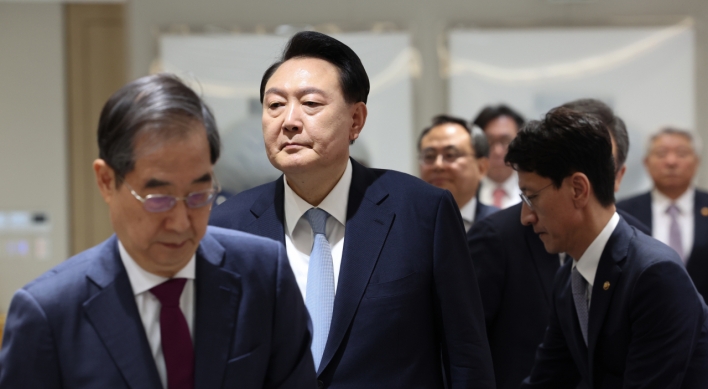[Takatoshi Ito] East Asian security after Ukraine
By Korea HeraldPublished : March 28, 2022 - 05:30

The Ukraine war, though far away, poses a substantial risk to East Asia. China is watching the conflict -- and the West’s response -- closely. If Russia pays a high price for its actions, with sanctions enduring long enough to decimate its economy, China may be discouraged from taking military action against Taiwan, at least until it can ensure that its economy is well protected.
If, however, Russia is rewarded for its invasion, installing a puppet government in Kyiv and securing the relatively quick rollback of Western sanctions, China might be emboldened to increase its pressure on Taiwan, and even to invade the island at the earliest opportunity. If it does, Japan may well be dragged into the conflict, because its own Senkaku Islands -- over which China has claimed sovereignty since the 1970s -- are less than 225 kilometers from Taiwan.
As former Prime Minister Shinzo Abe noted last December, “A Taiwan emergency is a Japanese emergency, and therefore an emergency for the Japan-US alliance.” But America’s response to the Ukraine war has suggested to many Japanese that this alliance may need to be strengthened -- and that Japan should not depend solely on the United States for its security.
This implies a reconsideration of some of the core tenets of Japanese security -- beginning with a pacifist constitution.
Japan’s postwar pacifism is enshrined in Article 9: “Aspiring sincerely to an international peace based on justice and order, the Japanese people forever renounce war as a sovereign right of the nation and the threat or use of force as means of settling international disputes.” As such, “land, sea, and air forces, as well as other war potential, will never be maintained. The right of belligerency of the state will not be recognized.”
Article 9 was interpreted somewhat more loosely during the Korean War, in order to give Japan some capacity for self-defense. In 1954, limited land, sea, and air forces were established, under the new Self-Defense Forces Law.
Nonetheless, Japan’s constitution fundamentally assumes that threats to the country are not great enough to require significant military capacity. As its preamble states, “We, the Japanese people, desire peace for all time and are deeply conscious of the high ideals controlling human relationship, and we have determined to preserve our security and existence, trusting in the justice and faith of the peace-loving peoples of the world.”
In other words, if Japan remained demilitarized, other countries would not be threatened by it, nor would they attack it. Many on Japan’s left have often echoed this logic, arguing that demilitarization and neutrality is a formula for peace.
But as the war in Ukraine shows, not all of the world’s peoples -- or, at least, their leaders -- are “peace-loving.” Beyond relentlessly bombing civilian areas, Russian President Vladimir Putin announced early in the conflict that he had placed his country’s nuclear forces on high alert.
This declaration put much of the world on edge, but it struck a particularly deep chord in Japan -- the only country that has suffered nuclear attacks. Japan has long opposed the existence of any nuclear weapons. But more countries have been developing them. One of these countries, North Korea, has also routinely tested missiles that often land in the Sea of Japan.
Ukraine is not a NATO member, and, since 1994, it has lacked a nuclear deterrent of its own. Moreover, US President Joe Biden has made clear that he is unwilling to risk a direct military clash with Russia, such as by establishing a no-fly zone over Ukraine. This has raised fears that, were Japan to come under attack by a nuclear power -- whether Russia, China, or North Korea -- the US would similarly refuse to defend it. Yes, the US has committed to do so under the US-Japan security treaty; but Japan cannot know whether and to what extent the US will honor that commitment until it is too late.
With this in mind, the ruling Liberal Democratic Party is seeking to amend the constitution to mention explicitly Japan’s right to self-defense act and recognize its self-defense forces. Even the dovish Prime Minister Fumio Kishida supports the amendment, saying that he will push the Diet to discuss it.
Moreover, some Japanese, most notably Abe, have advocated an expansion of the US-Japan security treaty to include a nuclear-sharing arrangement, as exists within NATO. For a country that vowed more than a half-century ago never to produce, possess, or host nuclear weapons, this is a highly contentious proposal. In the 1970s, it would have spurred a firestorm of criticism. But while Kishida has said that his government has no plans to reconsider Japan’s stance on nuclear weapons, some LDP politicians are now receptive to such a discussion.
How this debate evolves will depend significantly on the costs the world imposes on Russia. If Putin gets away with his aggression in Ukraine, securing concessions without paying a heavy and prolonged economic price, Japan will be motivated to take more radical action to ensure its security. In this sense, the West’s commitment to sanctions holds important implications for Asia’s stability.
Takatoshi Ito
Takatoshi Ito, a former Japanese deputy vice minister of finance, is a professor at the School of International and Public Affairs at Columbia University and a senior professor at the National Graduate Institute for Policy Studies in Tokyo. -- Ed.
(Project Syndicate)
-
Articles by Korea Herald







![[KH Explains] How should Korea adjust its trade defenses against Chinese EVs?](http://res.heraldm.com/phpwas/restmb_idxmake.php?idx=644&simg=/content/image/2024/04/15/20240415050562_0.jpg&u=20240415144419)











![[Today’s K-pop] Stray Kids to return soon: report](http://res.heraldm.com/phpwas/restmb_idxmake.php?idx=642&simg=/content/image/2024/04/16/20240416050713_0.jpg&u=)